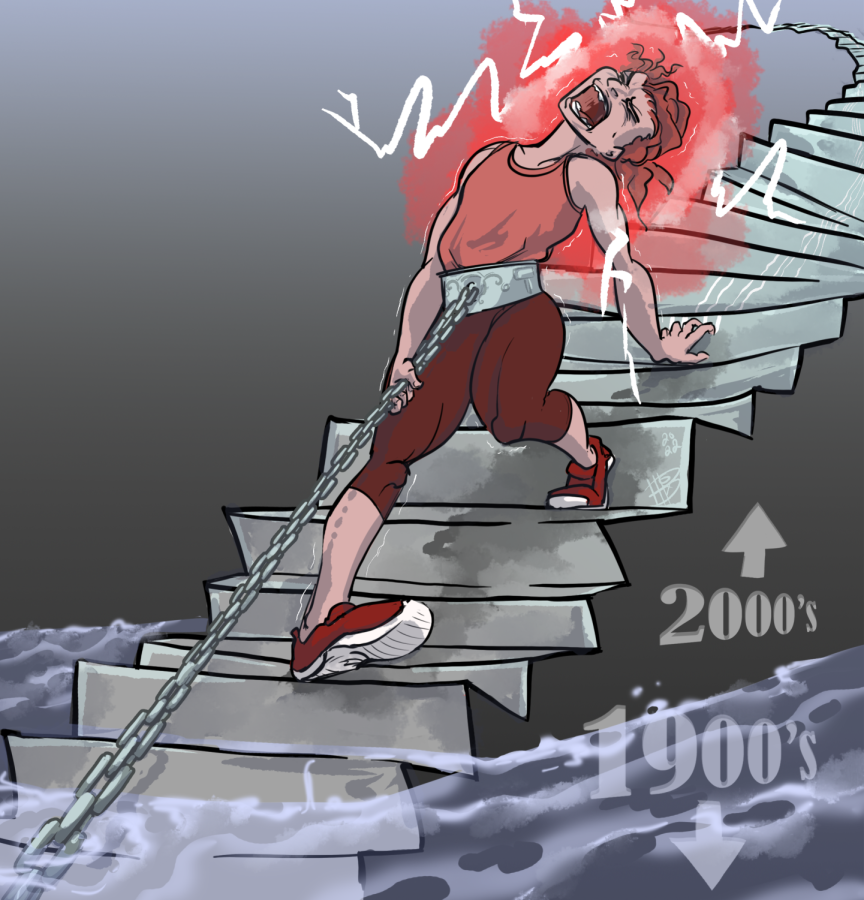- Beavers Digest
- Beavers Digest / Culture
- Beavers Digest / Culture / Community
- Beavers Digest / Culture / People
- Beavers Digest / Experience
- Beavers Digest / Experience / Campus
- Beavers Digest / Experience / Wellness
Cross country comparison: two students on Roe v. Wade
This illustration depicts a woman walking up stairs in the 2000s while being pulled down by a shackle around her midsection towards the 1900s, which is underwater. The U.S. Supreme Court overturned Roe v. Wade on June 24.
July 12, 2022
Oregon is one of 20 states where abortion is legal. According to an article by The Guardian, 60% of states are now at risk of banning abortion, with some states already implementing illegalization.
In 1973 the implementation of Roe v. Wade was a decision made by the U.S. Supreme Court that was supported by argumentation within the United States Constitution. Abortion, once protected by the constitution for 49 years, is no longer federally protected, as of June 24. It is up to each state to determine its laws in relation to those seeking an abortion.
Roe v. Wade once allowed for essential and sometimes life-saving services to be provided to women in the United States. Now, with the U.S. Supreme Court overturning people’s protected rights to an abortion, women and other people with female reproductive organs in America have lost full autonomy over their bodies.
“There are many reasons why someone might need abortion services, but that does not matter; it is the woman’s choice to select her future and choose what she will do with her body,” said Jessica Mylan, a graduate student at Oregon State University.
According to National Public Radio, 22 states have trigger laws ready that instantly outlawed abortion the second Roe v. Wade was overturned.
Mylan said she did not follow the politics of the overturning of Roe v. Wade but feels grateful to be a resident of Oregon.
“I feel grateful to live in Oregon because I do not think my options will be as limited, but I am still waiting to see how that unfolds,” Mylan said. “I have felt really safe in the past knowing that I have a lot of options for my body and my future.”
Many women in many states are going to be afraid for their futures and bodies, Mylan said.
Alexis Huscko, a junior at the University of Iowa in Iowa City, Iowa, lives in one of the many states where abortion laws are being threatened by government officials.
Currently, Iowa law only bans abortion after 20 weeks. As Republican Iowa Governor Kim Reynolds actively seeks to get an abortion ban passed for individuals who are six weeks pregnant or more, many Iowans like Huscko want to have bodily autonomy.
“Body autonomy is about freedom,” Huscko said. “If you do not have the right to make life-altering decisions about your body, are you free?”
In addition to being a full-time student, Huscko raises her two children—Ophelia, age 4, and Odin, age 3—with co-parent Michale Colon. Although she is now a mom, Huscko says she had an abortion when she was 19 years old.
“I found out I was pregnant at five weeks and went to Planned Parenthood,” Huscko said. “They had me watch a video about the tough questions of having an abortion and all the things to consider emotionally after.”
Planned Parenthood is a nonprofit organization that delivers reproductive health care, sex education and information to millions of people worldwide. Their website also offers information and guidance for people looking to learn more about or access abortion services near them.
Huscko had to have a dilation and curettage procedure done to ensure cells were removed from the pill they gave her for the abortion. The Mayo Clinic states that a D&C procedure is a procedure done to remove tissue from inside the uterus.
“Had I not had these services, my entire life would be different,” Huscko said.
Huscko believes that if she had her children earlier, she would not have had the opportunity to go to college or get a job.
“I can’t even fathom what I would have had to go through,” Huscko said.
Currently, the University of Iowa Student Health department provides condoms and contraceptives to students such as plan B or intrauterine devices, often called IUDs. Their website does not mention anything about abortion services.
Oregon State University’s Student Health Services also provides similar services. After repeated inquiries, OSU SHS did not respond with details on their services in time for publication.
Their website states that when an unplanned pregnancy is confirmed they will make all options available for a student and will assist students with accessing abortion services elsewhere. Mylan believes SHS services are impactful.
“OSU is very understanding and sympathetic to the needs of individuals. They also offer various contraceptive services to give individuals autonomy and freedom,” Mylan said.
Although students in Oregon have legal protection, it is clear that people seeking abortions in other states are experiencing a shift in their world.
“Understand that this will likely cause a lot of emotional struggle and panic for individuals unprepared to have a family,” Mylan said.
Just 1,900 miles away from Corvallis in Iowa, Huscko is already living in fear.
“At any time, my body could be weaponized, and I could be chained to the projected responsibility of my sex,” Huscko said.
As an abuse survivor and mother, the new ruling on Roe v Wade hits home.
“Children are one of the hardest responsibilities on the planet,” Huscko said. “Innocent children will suffer because of the realities of the current political and economic system in the United States.”
As people in America grapple with shifts in their states’ laws, Huscko believes people need to vote in new officials.
“It is not hopeless, and we must fight back against this oppression,” Huscko said.
Many may be wondering what steps to take as more states restrict access to abortion. Huscko offers one answer.
“We need to weaponize our fear,” Huscko said. “We need to build from this and take back our rights.”






